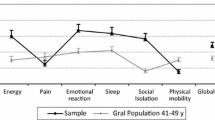Abstract.
Background: The aim of this study was to investigate predictors of Quality of Life in a group of severely mentally ill substance abusers. These patients took part in a multi-centre study aimed at improving co-operation between psychiatric and social services in Sweden during the years 1995 to 1998. Methods: Two hundred and eighty-eight patients, 62.4 % men, were included in the study. The criteria to enter the study were to have a diagnosis of severe mental illness and a diagnosis of substance dependence according to the DSM-III-R criteria. Quality of Life (QoL) was measured by a global assessment, Cantril's ladder (1965). Initially and after 18 months the following measurements were also used: Addiction Severity Index (ASI), Symptom Check List 90 (SCL–90) and The Clinical Rating Scale (CRS) for Alcohol Use (AUS) and Drug Use (DUS). Results: Initially those who were older and those who had an apartment of their own or who lived in sheltered living had a higher QoL than the others. Those belonging to the borderline personality disorder subgroup had a lower QoL than those belonging to other psychiatric diagnostic subgroups. At follow-up QoL had improved significantly. Improvement in QoL was related to improvements in physical health, legal and family problems, psychiatric symptoms and a reduction of alcohol and drug problems (ASI), global functioning (GAF) and psychological problems (SCL–90). A multiple stepwise regression analysis showed that improvement in QoL primarily was predicted by improvements in psychiatric symptoms. Number of months without alcohol and drugs were positively associated with improvement in QoL. As a whole, at follow-up the QoL is still not high. Conclusions: In this group of severely mentally ill substance abusers, improvement in QoL was primarily predicted by improvements in psychiatric symptoms. Further, less alcohol and drug abuse seems to augment the subjective feeling of QoL.
Similar content being viewed by others
Author information
Authors and Affiliations
Additional information
Received: 8 May 2002 / Accepted: 10 September 2002
Correspondence to Ingela Schaar
Rights and permissions
About this article
Cite this article
Schaar, I., Öjehagen, A. Predictors of improvement in quality of life of severely mentally ill substance abusers during 18 months of co-operation between psychiatric and social services. Soc Psychiatry Psychiatr Epidemiol 38, 83–87 (2003). https://doi.org/10.1007/s00127-003-0604-9
Issue Date:
DOI: https://doi.org/10.1007/s00127-003-0604-9




